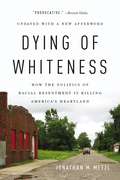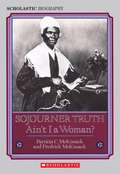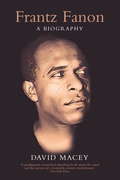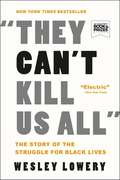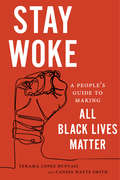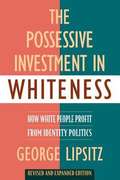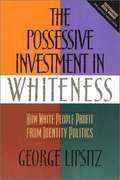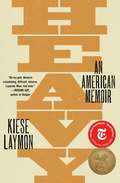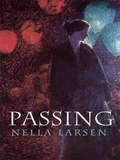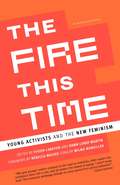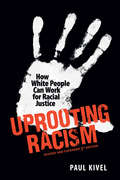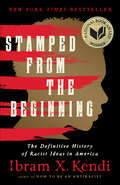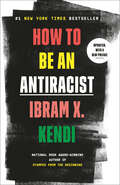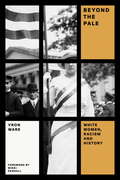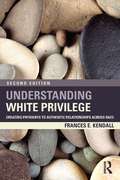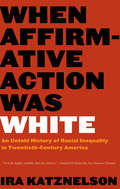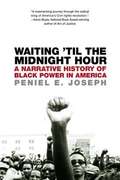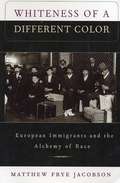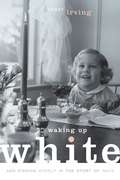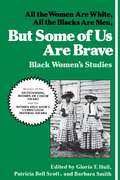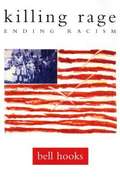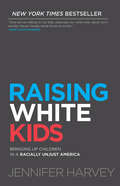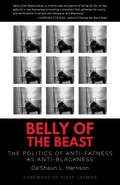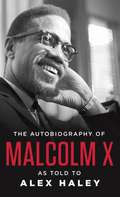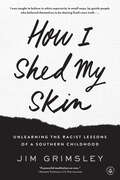Special Collections
Anti-Racism 101
- Table View
- List View
Dying of Whiteness
by Jonathan M. MetzlA physician's "provocative" (Boston Globe) and "timely" (Ibram X. Kendi, New York Times Book Review) account of how right-wing backlash policies have deadly consequences -- even for the white voters they promise to help. In election after election, conservative white Americans have embraced politicians who pledge to make their lives great again. But as physician Jonathan M. Metzl shows in Dying of Whiteness, the policies that result actually place white Americans at ever-greater risk of sickness and death. Interviewing a range of everyday Americans, Metzl examines how racial resentment has fueled progun laws in Missouri, resistance to the Affordable Care Act in Tennessee, and cuts to schools and social services in Kansas. He shows these policies' costs: increasing deaths by gun suicide, falling life expectancies, and rising dropout rates. Now updated with a new afterword, Dying of Whiteness demonstrates how much white America would benefit by emphasizing cooperation rather than chasing false promises of supremacy.Winner of the Robert F. Kennedy Book Award
Sojourner Truth
by Patricia C. Mckissack and Fredrick MckissackThis 1993 Coretta Scott King Honor Book chronicles the life of African-American Sojourner Truth, a nineteenth-century preacher, abolitionist, and activist for the rights of African Americans and women.
Frantz Fanon
by David MaceyBorn in Martinique, Frantz Fanon (1925-61) trained as a psychiatrist in Lyon before taking up a post in colonial Algeria. He had already experienced racism as a volunteer in the Free French Army, in which he saw combat at the end of the Second World War. In Algeria, Fanon came into contact with the Front de Libération Nationale, whose ruthless struggle for independence was met with exceptional violence from the French forces. He identified closely with the liberation movement, and his political sympathies eventually forced him out the country, whereupon he became a propagandist and ambassador for the FLN, as well as a seminal anticolonial theorist.David Macey's eloquent life of Fanon provides a comprehensive account of a complex individual's personal, intellectual and political development. It is also a richly detailed depiction of postwar French culture. Fanon is revealed as a flawed and passionate humanist deeply committed to eradicating colonialism.Now updated with new historical material, Frantz Fanon remains the definitive biography of a truly revolutionary thinker.
They Can't Kill Us All
by Wesley LoweryOne of the Most Anticipated Books of Fall 2016 -- Publishers WeeklyOne of the Most Anticipated Books of Fall 2016--Elle11 Fall Books We Can't Wait to Read -- Seattle TimesA best book of fall 2016--Boston GlobeOne of the St. Louis Post-Dispatch's 20 Books to Watch, fall 2016One of Vulture's "7 Books You Need to Read this November"A deeply reported book that brings alive the quest for justice in the deaths of Michael Brown, Tamir Rice, and Freddie Gray, offering both unparalleled insight into the reality of police violence in America and an intimate, moving portrait of those working to end itConducting hundreds of interviews during the course of over one year reporting on the ground, Washington Post writer Wesley Lowery traveled from Ferguson, Missouri, to Cleveland, Ohio; Charleston, South Carolina; and Baltimore, Maryland; and then back to Ferguson to uncover life inside the most heavily policed, if otherwise neglected, corners of America today.In an effort to grasp the magnitude of the repose to Michael Brown's death and understand the scale of the problem police violence represents, Lowery speaks to Brown's family and the families of other victims other victims' families as well as local activists. By posing the question, "What does the loss of any one life mean to the rest of the nation?" Lowery examines the cumulative effect of decades of racially biased policing in segregated neighborhoods with failing schools, crumbling infrastructure and too few jobs.Studded with moments of joy, and tragedy, They Can't Kill Us All offers a historically informed look at the standoff between the police and those they are sworn to protect, showing that civil unrest is just one tool of resistance in the broader struggle for justice. As Lowery brings vividly to life, the protests against police killings are also about the black community's long history on the receiving end of perceived and actual acts of injustice and discrimination. They Can't Kill Us All grapples with a persistent if also largely unexamined aspect of the otherwise transformative presidency of Barack Obama: the failure to deliver tangible security and opportunity to those Americans most in need of both.
Stay Woke
by Candis Watts Smith and Tehama Lopez BunyasiThe essential guide to understanding how racism works and how racial inequality shapes black lives, ultimately offering a road-map for resistance for racial justice advocates and antiracists When #BlackLivesMatter went viral in 2013, it shed a light on the urgent, daily struggles of black Americans to combat racial injustice. The message resonated with millions across the country. Yet many of our political, social, and economic institutions are still embedded with racist policies and practices that devalue black lives. Stay Woke directly addresses these stark injustices and builds on the lessons of racial inequality and intersectionality the Black Lives Matter movement has challenged its fellow citizens to learn.In this essential primer, Tehama Lopez Bunyasi and Candis Watts Smith inspire readers to address the pressing issues of racial inequality, and provide a basic toolkit that will equip readers to become knowledgeable participants in public debate, activism, and politics. This book offers a clear vision of a racially just society, and shows just how far we still need to go to achieve this reality. From activists to students to the average citizen, Stay Woke empowers all readers to work toward a better future for black Americans.
The Possessive Investment in Whiteness
by George LipsitzIn this unflinching look at white supremacy, George Lipsitz argues that racism is a matter of interests as well as attitudes, a problem of property as well as pigment. Above and beyond personal prejudice, whiteness is a structured advantage that produces unfair gains and unearned rewards for whites while imposing impediments to asset accumulation, employment, housing, and health care for minorities. Reaching beyond the black/white binary, Lipsitz shows how whiteness works in respect to Asian Americans, Latinos, and Native Americans. Lipsitz delineates the weaknesses embedded in civil rights laws, the racial dimensions of economic restructuring and deindustrialization, and the effects of environmental racism, job discrimination and school segregation. He also analyzes the centrality of whiteness to U. S. culture, and perhaps most importantly, he identifies the sustained and perceptive critique of white privilege embedded in the radical black tradition. This revised and expanded edition also includes an essay about the impact of Hurricane Katrina on working class Blacks in New Orleans, whose perpetual struggle for dignity and self determination has been obscured by the city's image as a tourist party town.
The Possessive Investment in Whiteness
by George LipsitzHard-hitting expose of American systemic societal racism.
Heavy
by Kiese LaymonIn this powerful and provocative memoir, genre-bending essayist and novelist Kiese Laymon explores what the weight of a lifetime of secrets, lies, and deception does to a black body, a black family, and a nation teetering on the brink of moral collapse.
Kiese Laymon is a fearless writer. In his essays, personal stories combine with piercing intellect to reflect both on the state of American society and on his experiences with abuse, which conjure conflicted feelings of shame, joy, confusion and humiliation. Laymon invites us to consider the consequences of growing up in a nation wholly obsessed with progress yet wholly disinterested in the messy work of reckoning with where we’ve been. In Heavy, Laymon writes eloquently and honestly about growing up a hard-headed black son to a complicated and brilliant black mother in Jackson, Mississippi.
From his early experiences of sexual violence, to his suspension from college, to his trek to New York as a young college professor, Laymon charts his complex relationship with his mother, grandmother, anorexia, obesity, sex, writing, and ultimately gambling. By attempting to name secrets and lies he and his mother spent a lifetime avoiding, Laymon asks himself, his mother, his nation, and us to confront the terrifying possibility that few in this nation actually know how to responsibly love, and even fewer want to live under the weight of actually becoming free.
A personal narrative that illuminates national failures, Heavy is defiant yet vulnerable, an insightful, often comical exploration of weight, identity, art, friendship, and family that begins with a confusing childhood—and continues through twenty-five years of haunting implosions and long reverberations.
Winner of the 2018 Andrew Carnegie Medal for Non-Fiction
Passing
by Nella LarsenMarried to a successful physician and prominently ensconced in Harlem's vibrant society of the 1920s, Irene Redfield leads a charmed existence-until she is shaken out of it by a chance encounter with a childhood friend who has been "passing for white."
An important figure in the Harlem Renaissance, Nella Larsen was the first African-American woman to be awarded a Guggenheim fellowship. Her fictional portraits of women seeking their identities through a fog of racial confusion were informed by her own Danish-West Indian parentage, and Passing offers fascinating psychological insights into issues of race and gender.
The Fire This Time
by Vivien Labaton and Dawn Lundy MartinYoung feminists today are becoming activists on behalf of many causes beyond the classic--and indispensable--feminist ones of reproductive rights and equal pay for equal work. InThe Fire This Time, Dawn Martin, one of four founders of The Third Wave Foundation--a multiracial, multi-issue, and multicultural activist organization--and Vivien Labaton, its first executive director, offer an exciting cross section of feminist voices that express new directions in activism, identity, and thought. Ayana Bird dissects the role of black women in hip-hop; Joshua Breitbart and Ana Noguiera demonstrate how Indimedia can break the hold of the corporate media over the news; and Jennifer Bleyer reviews the exhilarating power unleashed by the GirlZine movement. Anna Kirkland's analysis of transsexual and transgendered people and the law is deeply thoughtful, and Shireen Lee's piece on women, technology, and feminism envisions empowering prospects for women. . Ranging from media and culture to politics and globalization,The Fire This Timeis a call to new frontiers of activism, and helps reinvent feminism for a new generation. From the Trade Paperback edition.
Uprooting Racism
by Paul KivelIn 2008, the United States elected its first black president, and recent polls show that only 22 percent of white people in the US believe that racism is a major societal problem. On the surface, it may seem to be in decline. However the evidence of discrimination persists throughout our society. Segregation and inequalities in education, housing, health care and the job market continue to be the norm. Post 9/11, increased insecurity and fear have led to an epidemic of the scapegoating and harassment of people of color. Uprooting Racism offers a framework for understanding institutional racism. It provides practical suggestions, tools, examples and advice on how white people can intervene in interpersonal and organizational situations to work as allies for racial justice. Completely revised and updated, this expanded third edition directly engages the reader through questions, exercises and suggestions for action, and takes a detailed look at current issues such as affirmative action, immigration and health care. It also includes a wealth of information about specific cultural groups such as Muslims, people with mixed-heritage, Native Americans, Jews, recent immigrants, Asian Americans, and Latino/as. Previous editions of Uprooting Racism have sold more than 50,000 copies. Accessible, personal, supportive and practical, this book is ideal for students, community activists, teachers, youth workers and anyone interested in issues of diversity, multiculturalism and social justice.
Stamped From the Beginning
by Ibram X. KendiSome Americans cling desperately to the myth that we are living in a post-racial society, that the election of the first Black president spelled the doom of racism. In fact, racist thought is alive and well in America--more sophisticated and more insidious than ever. And as award-winning historian Ibram X. Kendi argues in Stamped from the Beginning, if we have any hope of grappling with this stark reality, we must first understand how racist ideas were developed, disseminated, and enshrined in American society.
In this deeply researched and fast-moving narrative, Kendi chronicles the entire story of anti-Black racist ideas and their staggering power over the course of American history. Stamped from the Beginning uses the life stories of five major American intellectuals to offer a window into the contentious debates between assimilationists and segregationists and between racists and anti racists. From Puritan minister Cotton Mather to Thomas Jefferson, from fiery abolitionist William Lloyd Garrison to brilliant scholar W.E.B. Du Bois to legendary anti-prison activist Angela Davis, Kendi shows how and why some of our leading proslavery and pro-civil rights thinkers have challenged or helped cement racist ideas in America.
Contrary to popular conceptions, racist ideas did not arise from ignorance or hatred. Instead, they were devised and honed by some of the most brilliant minds of each era. These intellectuals used their brilliance to justify and rationalize deeply entrenched discriminatory policies and the nation's racial disparities in everything from wealth to health. And while racist ideas are easily produced and easily consumed, they can also be discredited. In shedding much-needed light on the murky history of racist ideas, Stamped from the Beginning offers us the tools we need to expose them--and in the process, gives us reason to hope.
Winner of the National Book Award
A New York Times Bestseller
How to Be an Antiracist
by Ibram KendiFrom the National Book Award–winning author of Stamped from the Beginning comes a “groundbreaking” (Time) approach to understanding and uprooting racism and inequality in our society—and in ourselves. “The only way to undo racism is to consistently identify and describe it—and then dismantle it.”
Antiracism is a transformative concept that reorients and reenergizes the conversation about racism—and, even more fundamentally, points us toward liberating new ways of thinking about ourselves and each other.
At it's core, racism is a powerful system that creates false hierarchies of human value; its warped logic extends beyond race, from the way we regard people of different ethnicities or skin colors to the way we treat people of different sexes, gender identities, and body types.
Racism intersects with class and culture and geography and even changes the way we see and value ourselves. In How to Be an Antiracist, Kendi takes readers through a widening circle of antiracist ideas—from the most basic concepts to visionary possibilites—that will help readers see all forms of racism clearly, understand their posionous consequences, and work to oppose them in our systems and in ourselves.
Kendi weaves an electrifying combination of ethics, history, law, and science with his own personal story of awakening to antiracism. This is an essential work for anyone who wants to go beyond the awareness of racism to the next step: contributing to the formation of a just and equitable society.
A New York Times Bestseller
Beyond the Pale
by Vron Ware and Mikki KendallHow have ideas about white women figured in the history of racism? Vron Ware argues that they have been central, and that feminism has, in many ways, developed as a political movement within racist societies. Dissecting the different meanings of femininity and womanhood, Beyond the Pale examines the political connections between black and white women, both within contemporary racism and feminism, as well as in historical examples like the anti-slavery movement and the British campaign against lynching in the United States. Beyond the Pale is a major contribution to anti-racist work, confronting the historical meanings of whiteness as a way of overcoming the moralism that so often infuses anti-racist movements.From the Trade Paperback edition.
Understanding White Privilege
by Frances KendallKnowingly and unknowingly we all grapple with race every day. Understanding White Privilege delves into the complex interplay between race, power, and privilege in both organizations and private life. It offers an unflinching look at how ignorance can perpetuate privilege, and offers practical and thoughtful insights into how people of all races can work to break this cycle. Based on thirty years of work in diversity and colleges, universities, and corporations, Frances Kendall candidly invites readers to think personally about how race — theirs and others’ — frames experiences and relationships, focusing squarely on white privilege and its implications for building authentic relationships across race. This much-anticipated revised edition includes two full new chapters, one on white women and another extending the discussion on race. It continues the important work of the first, deepening our knowledge of the recurring history on which cross-race relationships issues exist. Kendall’s book provides readers with a more meaningful understanding of white privilege and equips them with strategies for making personal and organizational changes.
When Affirmative Action Was White
by Ira KatznelsonA groundbreaking work that exposes the twisted origins of affirmative action. In this "penetrating new analysis" (New York Times Book Review) Ira Katznelson fundamentally recasts our understanding of twentieth-century American history and demonstrates that all the key programs passed during the New Deal and Fair Deal era of the 1930s and 1940s were created in a deeply discriminatory manner. Through mechanisms designed by Southern Democrats that specifically excluded maids and farm workers, the gap between blacks and whites actually widened despite postwar prosperity. In the words of noted historian Eric Foner, "Katznelson's incisive book should change the terms of debate about affirmative action, and about the last seventy years of American history."
Waiting 'Til the Midnight Hour
by Peniel E. JosephThe history of the large-scale political developments that shaped the course of the Black Power movement in America
Whiteness of a Different Color
by Mathew Frye JacobsonThe history of racial classification over time is a second such site: entire races have disappeared from view, from public discussion, and from modern memory.
Waking Up White, and Finding Myself in the Story of Race
by Debby IrvingWhite privilege. What is it, what does it mean? For twenty-five years, Debby Irving sensed inexplicable racial tensions in her personal and professional relationships. As a colleague and neighbor, she worried about offending people she dearly wanted to befriend. As an arts administrator, she didn't understand why her diversity efforts lacked traction. As a teacher, she found her best efforts to reach out to students and families of color left her wondering what she was missing. Then, in 2009, one "aha!" moment launched an adventure of discovery and insight that drastically shifted her worldview and upended her life plan. In Waking Up White, Irving tells her often cringe-worthy story with such openness that readers will turn every page rooting for her--and ultimately--for all of us.
But Some of Us Are Brave
by Gloria T. Hull and Patricia Bell Scott and Barbara SmithThis ground-breaking collection provides hours of enjoyment for the general reader and a wealth of materials needed to develop course units on black women; political theory, literary essays on major writers, guidelines for consciousness-raising about racism, and surveys of black women's contributions to the blues. "Important and innovative. "--Feminist Bookstore News
Killing Rage
by Bell HooksOne of our country's premier cultural and social critics, Bell Hooks has always maintained that eradicating racism and eradicating sexism must go hand in hand. These twenty-three essays are written from a black and feminist perspective, and they tackle the bitter difficulties of racism by envisioning a world without it. They address a spectrum of topics having to do with race and racism in the United States: psychological trauma among African Americans; friendship between black women and white women; anti-Semitism and racism; and internalized racism in movies and the media. And in the title essay, Hooks writes about the "Killing Rage" -- the fierce anger of black people stung by repeated instances of everyday racism -- finding in that rage a healing source of love and strength and a catalyst for positive change.
Raising White Kids
by Jennifer HarveyRaising White Kids is a book for families, churches, educators and communities who want to equip their children to be active and able participants in a society that is becoming one of the most racially diverse in the world while remaining full of racial tensions. For white people who are committed to equity and justice, living in a nation that remains racially unjust and deeply segregated creates unique conundrums.
These conundrums begin early in life and impact the racial development of white children in powerful ways. What can we do within our homes, communities and schools? Should we teach our children to be “colorblind”? Or, should we teach them to notice race? What roles do we want to equip them to play in addressing racism when they encounter it? What strategies will help our children learn to function well in a diverse nation?
Talking about race means naming the reality of white privilege and hierarchy. How do we talk about race honestly, then, without making our children feel bad about being white? Most importantly, how do we do any of this in age-appropriate ways?
While a great deal of public discussion exists in regard to the impact of race and racism on children of color, meaningful dialogue about and resources for understanding the impact of race on white children are woefully absent. Raising White Kids steps into that void.
A New York Times Bestseller
Belly of the Beast
by Da'Shaun L. HarrisonExploring the intersections of Blackness, gender, fatness, health, and the violence of policing.To live in a body both fat and Black is to exist at the margins of a society that creates the conditions for anti-fatness as anti-Blackness. Hyper-policed by state and society, passed over for housing and jobs, and derided and misdiagnosed by medical professionals, fat Black people in the United States are subject to sociopolitically sanctioned discrimination, abuse, condescension, and trauma. Da&’Shaun Harrison--a fat, Black, disabled, and nonbinary trans writer--offers an incisive, fresh, and precise exploration of anti-fatness as anti-Blackness, foregrounding the state-sanctioned murders of fat Black men and trans and nonbinary masculine people in historical analysis. Policing, disenfranchisement, and invisibilizing of fat Black men and trans and nonbinary masculine people are pervasive, insidious ways that anti-fat anti-Blackness shows up in everyday life. Fat people can be legally fired in 49 states for being fat; they&’re more likely to be houseless. Fat people die at higher rates from misdiagnosis or nontreatment; fat women are more likely to be sexually assaulted. And at the intersections of fatness, Blackness, disability, and gender, these abuses are exacerbated. Taking on desirability politics, the limitations of gender, the connection between anti-fatness and carcerality, and the incongruity of &“health&” and &“healthiness&” for the Black fat, Harrison viscerally and vividly illustrates the myriad harms of anti-fat anti-Blackness. They offer strategies for dismantling denial, unlearning the cultural programming that tells us &“fat is bad,&” and destroying the world as we know it, so the Black fat can inhabit a place not built on their subjugation.
The Autobiography of Malcolm X
by Malcom X and Alex HaleyMemoir of Malcolm X , the dynamic American black militant, religious leader and activist who articulated the anger, the struggle, and the beliefs of African Americans in the 1960s.
How I Shed My Skin
by Jim GrimsleyMore than sixty years ago, the Supreme Court ruled in Brown v. Board of Education that America’s schools could no longer be segregated by race. Critically acclaimed novelist Jim Grimsley was eleven years old in 1966 when federally mandated integration of schools went into effect in the state and the school in his small eastern North Carolina town was first integrated. Until then, blacks and whites didn’t sit next to one another in a public space or eat in the same restaurants, and they certainly didn’t go to school together. Going to one of the private schools that almost immediately sprang up was not an option for Jim: his family was too poor to pay tuition, and while they shared the community’s dismay over the mixing of the races, they had no choice but to be on the front lines of his school’s desegregation. What he did not realize until he began to meet these new students was just how deeply ingrained his own prejudices were and how those prejudices had developed in him despite the fact that prior to starting sixth grade, he had actually never known any black people. Now, more than forty years later, Grimsley looks back at that school and those times--remembering his own first real encounters with black children and their culture. The result is a narrative both true and deeply moving. Jim takes readers into those classrooms and onto the playing fields as, ever so tentatively, alliances were forged and friendships established. And looking back from today’s perspective, he examines how far we have really come.
